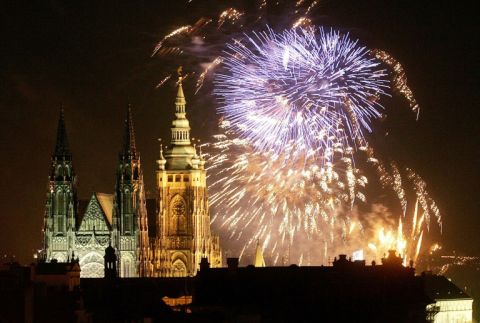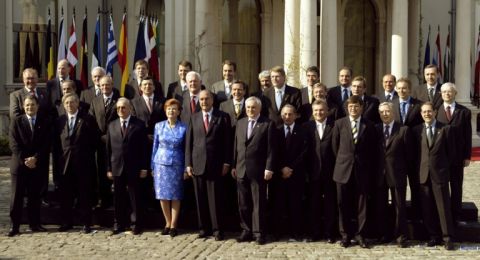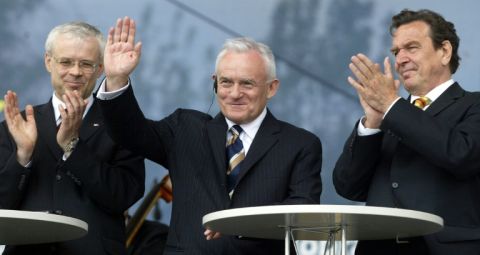Eastern enlargement

On May 1, 2004 the European Union carried out its biggest ever enlargement, welcoming eight states from the former communist bloc and two Mediterranean islands.
AFP's Berlin correspondent Deborah Cole sent the following story from Germany's border with the Czech Republic and Poland on the historic day.
ZITTAU, Germany, May 1, 2004 (AFP) - The leaders of wartime foes Germany, Poland and the Czech Republic hoisted the European Union flag together Saturday as Chancellor Gerhard Schroeder welcomed his neighbors into the enlarged bloc, 15 years after the fall of the Berlin Wall.
Schroeder, Czech Prime Minister Vladimir Spidla and Polish Prime Minister Leszek Miller met in the German border town of Zittau, after jubilant overnight parties hailing the entry of Poland and the Czech Republic along with eight other countries into the expanded EU.
"Dear citizens, above all for those of you who are older and lived through World War II and everything that came after it, who would have thought 60 years ago that there would be a day like this, a day on which Europe is united and we have a chance to make Europe a place of lasting peace and prosperity?" Schroeder said.
Spidla described Prague and Warsaw's EU accession as proof that "the consequences of the Second World War have been surmounted".
"The old Europe was one of xenophobia and war," the Czech leader said, describing the new Europe as one of "peace and unity".
- Peaceful revolutions -

"In 1989, the Iron Curtain fell, then came German reunification and today the EU is enlarging," he said. "I think that's not a bad performance for 15 years."
Miller said "our great Polish dream came true today" and joined Schroeder and Spidla in paying tribute to the peaceful revolutions in eastern Europe that buried communism and paved the way to a united Europe.
Schroeder singled out EU enlargement commissioner Guenter Verheugen for special thanks for managing the "at times difficult negotiations" that finally led to a European Union of 25 countries.
Verheugen took the stage in Zittau to celebrate the disappearance of the EU frontier between Germany and its neighbors.
"We have reached a point where borders do not matter anymore," he said.
The three leaders attended the symbolic first dig in Zittau of a road that will link the three countries and appeared briefly at celebrations in the two other cities before returning to German soil.
There, they climbed onto the sculpture of a boat's bow perched on the riverbank where they raised the blue European flag amid glorious spring sunshine.
In the audience, Justus Krauer, a German history student in his mid-20s, waved a small European flag of his own.
"It's historic and it's time that we celebrate it," he said of EU enlargement, looking bleary-eyed after a night of partying at the largest border crossing between Germany and Poland, linking Frankfurt-an-der-Oder in the west and Slubice in the east.

Thousands of citizens from the three countries rang in the biggest-ever expansion of the bloc at the stroke at midnight along their common borders to the sounds of fireworks, cheers and popping champagne corks.
Foreign Minister Joschka Fischer and his Polish counterpart Wlodwiermierz Cimoszewicz met on the bridge linking Frankfurt-an-der-Oder and Slubice embraced, marking a demonstrative end to the countries' bitter, bloody past.
On Saturday a few thousand people turned up in the neighboring cities of Zittau, Zradek nad Nisou in the Czech Republic and Bogatynia, Poland for the outdoor festival on the banks of the Neisse River with sausage, beer from the region and live music.
In the afternoon Schroeder, Spidla and Miller jetted to Dublin for the main EU enlargement celebration with leaders from across the Union, which beyond Poland and the Czech Republic now also includes Slovakia, Slovenia, Hungary, Cyprus and Malta as well as Lithuania, Latvia and Estonia.
